Striving for sustainability
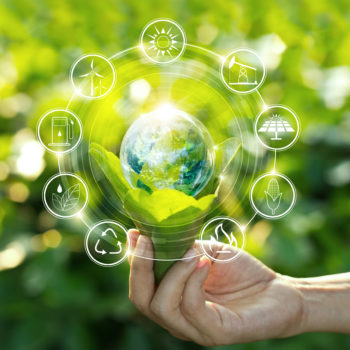
With nearly eight in 10 people indicating sustainability is important for them, according to a recent IBM report, far-reaching sustainability initiatives and plans have become increasingly central for FMCG companies, many of which are doing their utmost to improve their green credentials
28 April 2021

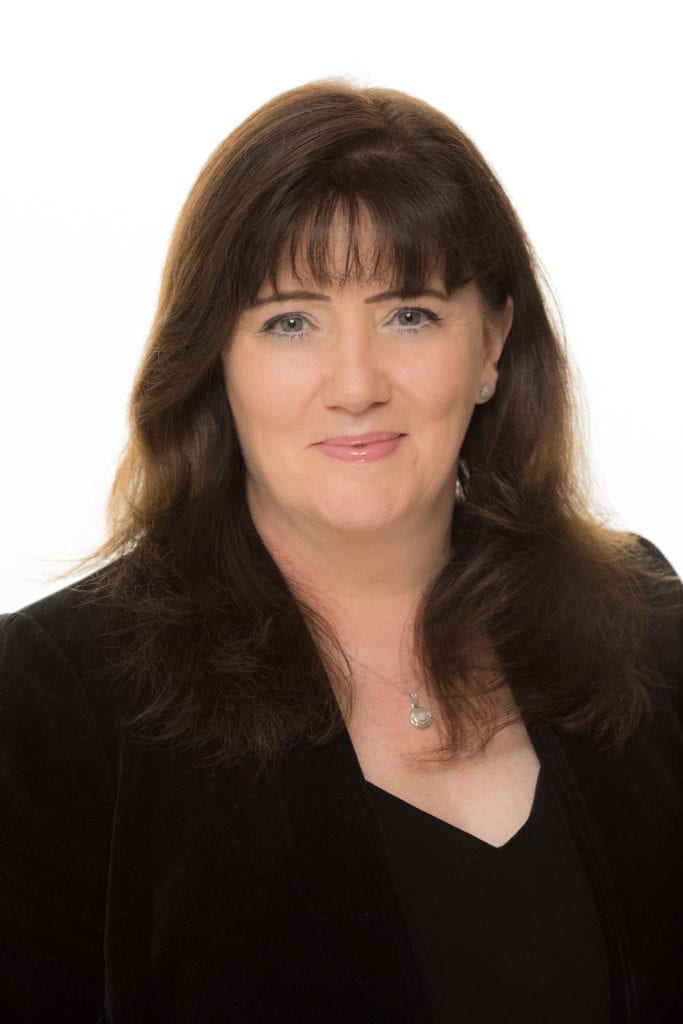
Joanne Mellon, logistics director, BWG Foods
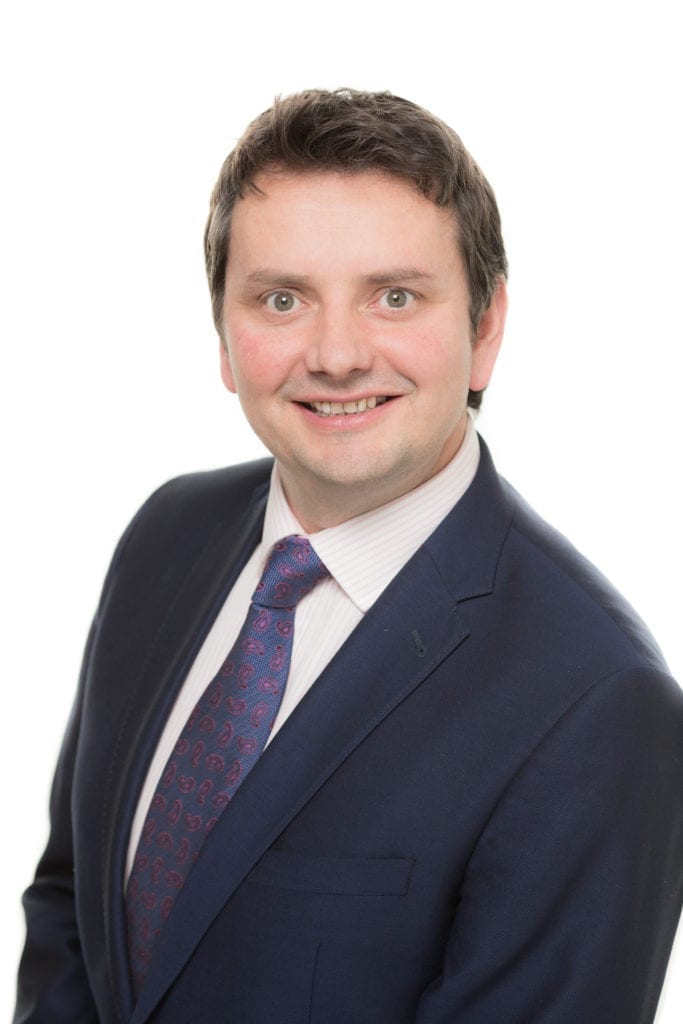
Ricky O’Brien, foodservice director, BWG Foods
Committed to a greener future
A pioneer within the sustainability sector, BWG Foods’ foodservice director Ricky O’Brien and logistics director Joanne Mellon outline the group’s commitment to the environment and sustainable business practices
BWG Foods is committed to creating a greener future and are making progress by reducing food waste, reducing plastic packaging, engaging in sustainable and ethical sourcing of foods and improving energy efficiency, which are all measures that are part of the group’s sustainability strategy.
The leading Irish retail and wholesale company has a proud record of championing environmental and social issues and causes, and bears the responsibility associated with its ambitious plans, with a passion that permeates the whole group. What drives BWG’s sustainability commitments is a core belief that employers, large and small, have a collective responsibility to ensure the behaviours, actions and processes through which they do business are responsible, ethical and make a positive contribution to the environment, society and the economy.
Expectations around sustainability
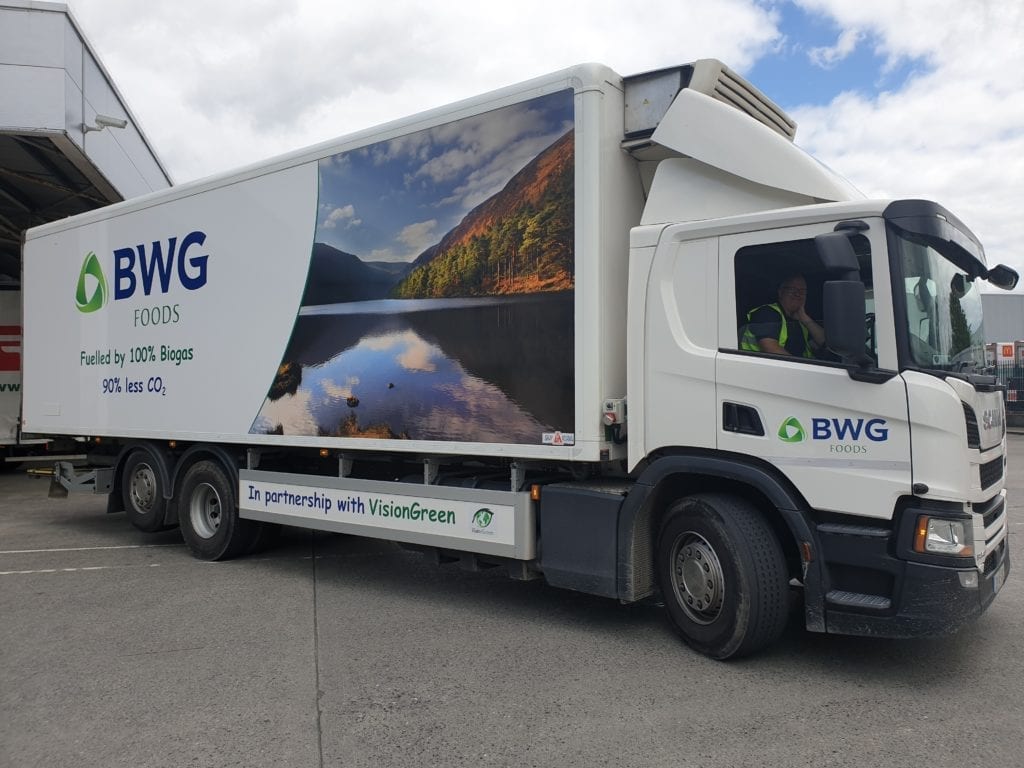
The first two of BWG Foods’ biogas fuelled trucks will lead to a reduction of 200 tonnes of carbon emissions annually by the business
Increasingly, consumers and employees expect to see sustainability in action and can better connect with purpose-driven organisations that put sustainable business practices at their core.
At BWG, the group states its increasing commitment to sustainability is borne out of a desire to make positive change across the entire operation. The team regularly review and consider the myriad of ways in which their business effects the environment, the communities they serve and, of course, their people.
Origin Green status
The sustainability strategy was developed as part of BWG Foods’ bid to secure Bord Bia’s Origin Green status, which it has now been awarded. BWG Foods worked very closely with Origin Green, the world’s first national sustainability programme to develop a sophisticated and comprehensive strategy that includes measurable targets around initiatives that will contribute positively to the environment, and also to local communities in which BWG operates, as foodservice director, Ricky O’Brien explains.
“Becoming a member of the Origin Green community signifies our achievements to date and our strong focus on sustainability into the future,” says O’Brien. “Our commitment to sustainability is predicated upon the desire to do the right thing by our customers and our communities, by reducing our environmental footprint, contributing to healthier diets, and supporting local communities.
“We have developed a sophisticated and comprehensive sustainability strategy that includes measurable targets around initiatives that will contribute positively to the environment and also to the local communities in which BWG, our retailers and our customers in the foodservice industry operate,” he continues. “We have focused our efforts on a range of initiatives designed to reduce our environmental impact including transitioning to renewable energy sources, lowering carbon emissions, reducing waste output and adopting more sustainable sourcing methods within our supply chain.”
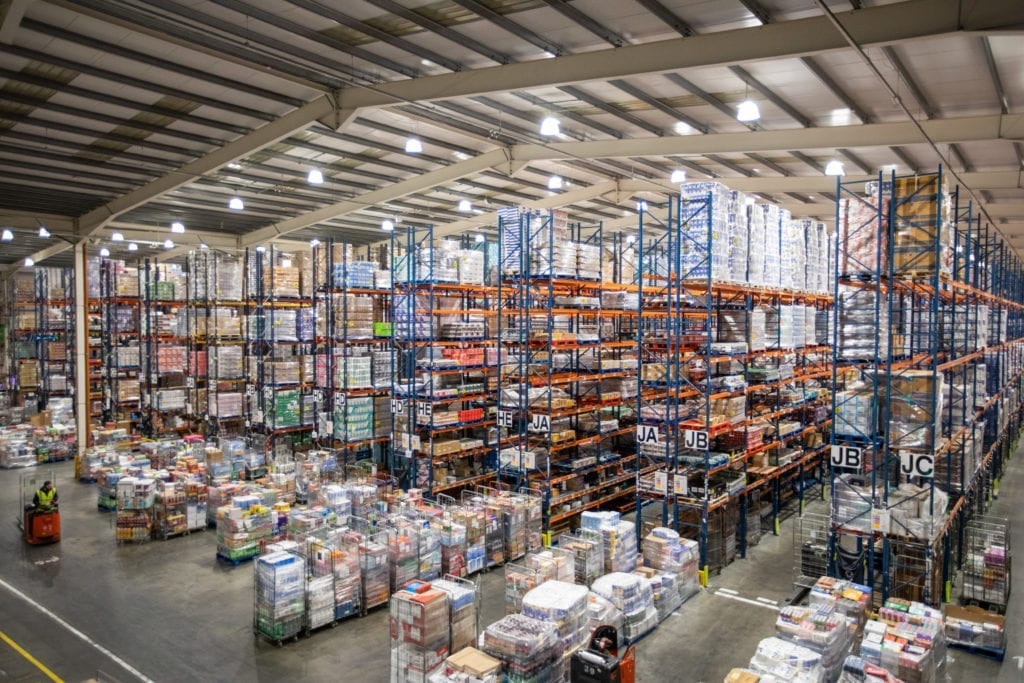
The group recently invested in LED lighting across its retail network, Head Office and National Distribution Centre
Green awards
BWG has a strong tradition of pursuing a “greener agenda” within its business. In 2020, for example, the company was honoured with the prestigious Environment Award at the 2020 Fleet Transport Awards in recognition of their becoming the first FMCG group in the country to launch a fleet of CNG (compressed natural gas) vehicles. These vehicles significantly reduce the carbon intensity of BWG’s expansive distribution operation, generating CO2 savings of up to 22% per CNG truck. BWG also recently became the first FMCG group in Ireland to launch an initial fleet of two heavy goods delivery vehicles (HGVs) fuelled with biogas in place of traditional diesel fuel. The vehicles will deliver a 90% reduction in transport related carbon emissions.
The launch of the 26 tonne biogas fuelled trucks with electric fridge units, which each cost in the region of €180,000, follows a partnership between BWG and two Irish startups – VisionGreen and Generation Green – and represents the most significant development in terms of green transport in Ireland. The trucks are the most efficient transport vehicles across the sector and are the quietest, meaning less noise pollution across towns and city centres. The first two of BWG Foods’ biogas fuelled trucks will lead to a reduction of 200 tonnes of carbon emissions annually by the business.
BWG also contributes food waste from its 240,000sq ft National Distribution Centre at Kilcarbery to the biogas production site at Nurney, County Kildare, making this a truly circular solution.
Logistical and operational efficiencies
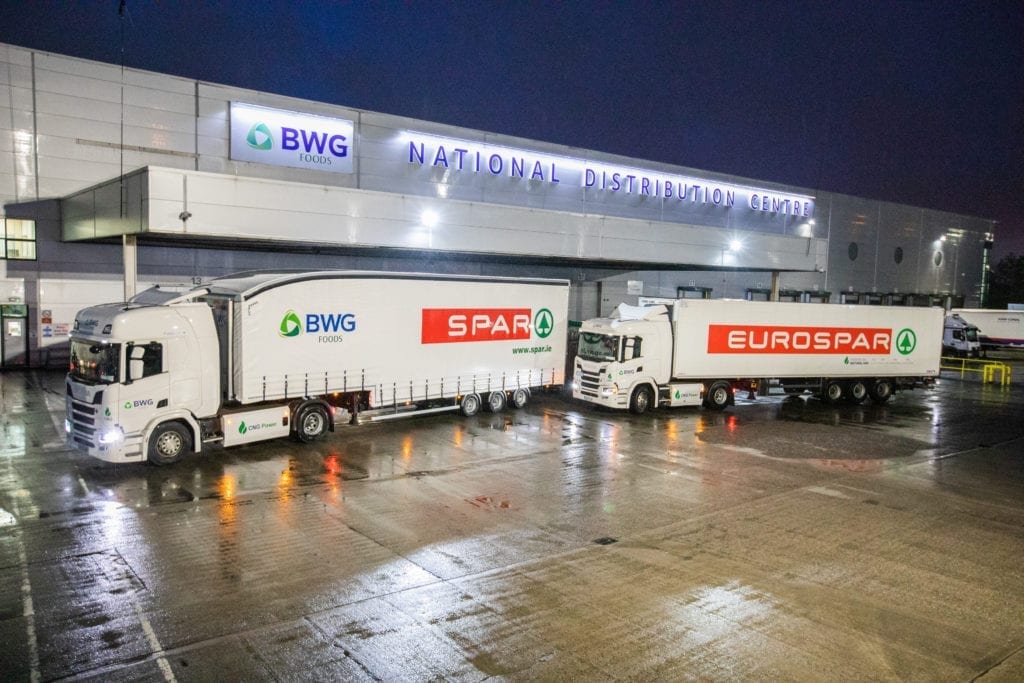
Compressed natural gas (CNG) vehicles significantly reduce the carbon intensity of BWG’ s expansive distribution operation, generating CO2 savings of up to 22% per CNG truck
Furthermore, in 2016, as part of its wider supply chain sustainability programme, BWG Foods also implemented a number of operational efficiency projects that have already led to collective CO2 emission savings across the business. This included a re-routing programme, which led to the reduction of more than 2.3 million kilometres travelled annually and an increase of individual delivery vehicle capacity by 15%.
Since then, BWG has also introduced two new double deck fridge trailers to its fleet, reducing their on road footprint by a further 260K klms and 170 tonnes of C02 per annum.
Joanne Mellon is the logistics director with BWG Foods and has been championing the company’s ‘Green Drive’ for some time. “We, at BWG, are very passionate about finding new solutions that can reduce our environmental impact, particularly given the significant scale of our business, and the expansive supply chain operation that supports it,” she says. “This ambition crosses the business and we are committed to continuing to invest in new technologies and initiatives that will facilitate our continuing to pioneer less carbon intensive methods of delivery and operations.
“For example, we recently completed the installation of almost 800 solar panels at our National Distribution Centre in Dublin,” Mellon adds. “The installation, which takes up approximately 1,350m2 of roof space, will have a generation capacity of 250KW, representing enough energy to power the equivalent of approximately 50 homes for a year.
“Our commitment to sustainability is borne out of the desire to always do the right thing by our customers and our communities. We value the importance of reducing our environmental footprint, contributing to healthier diets, and supporting local communities and this sustainability strategy will enable us to make a significant and tangible positive impact.”
Further investments
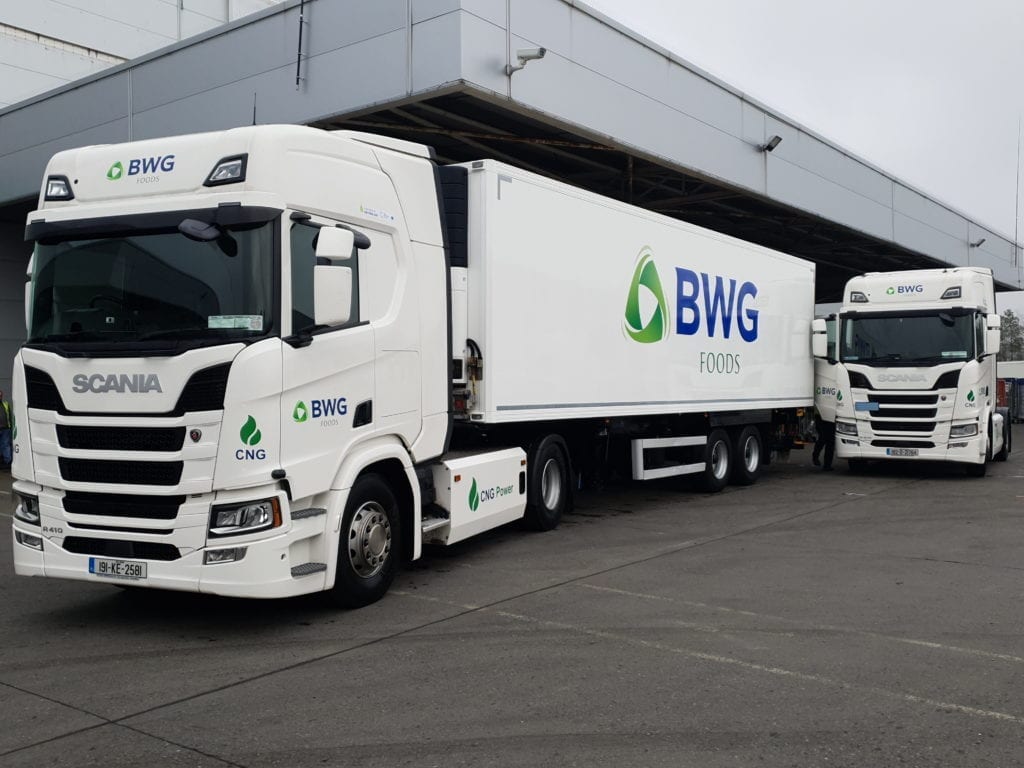 BWG Foods has also invested in a new Fronius battery charging system for its extensive mechanical handling equipment (forklifts, pallet trucks, etc.) fleet that reduces electrical output, thus reducing carbon emissions by 170 tonnes per annum. It has also invested €500,000 in a new fleet of mechanical handling equipment that boasts market leading energy efficiency technology. Over €2 million is also to be invested in the continued rollout of LED lighting across the group’s retail estate, having already invested €2.5 million in energy efficient lighting. Another core component of BWG’s strategy is to reduce its energy output and to increase energy efficiency across its entire distribution operation. Overall, it is planned to reduce energy usage by over 10% across their entire operations by 2024.
BWG Foods has also invested in a new Fronius battery charging system for its extensive mechanical handling equipment (forklifts, pallet trucks, etc.) fleet that reduces electrical output, thus reducing carbon emissions by 170 tonnes per annum. It has also invested €500,000 in a new fleet of mechanical handling equipment that boasts market leading energy efficiency technology. Over €2 million is also to be invested in the continued rollout of LED lighting across the group’s retail estate, having already invested €2.5 million in energy efficient lighting. Another core component of BWG’s strategy is to reduce its energy output and to increase energy efficiency across its entire distribution operation. Overall, it is planned to reduce energy usage by over 10% across their entire operations by 2024.
Additionally, BWG has recently adopted Formula One-derived aerodynamic technology across its nationwide network of stores to boost the efficiency of refrigeration units. The technology guides cold air down fridges to avoid cold air being lost from units, delivering energy savings of approximately 20% without the need for glass doors. To date, 1,600 eco blades have been installed across the network, equivalent to 500m of refrigeration space. The Group also recently invested in LED lighting across its retail network, Head Office and National Distribution Centre. 4,500 recycled light fittings using fully recycled materials were deployed across the retail network.
In this together
When it comes to sustainability, the whole is most certainly greater than the sum of the parts and there is a need to ensure that everyone is collectively contributing all the time. Creating a behaviour change across the organisation has been very important on BWG’s journey, as Joanne Mellon explains.
“To instil a ‘sustainable’ mindset within an organisation, leadership is key,” she says. “Firstly, demonstrating commitment through the adoption of new solutions sends a signal throughout the organisation that the business is willing to invest in the change. Secondly, communication and engagement are equally important to ensuring there isn’t a siloed approach to sustainability.
“Each member of our leadership team is committed to exploring new ideas and encourages our people to come forward with alternative options,” Mellon adds. “This echoes throughout the business from the bottom up and the ingenuity of people within BWG to find new solutions has been fantastic to witness.”
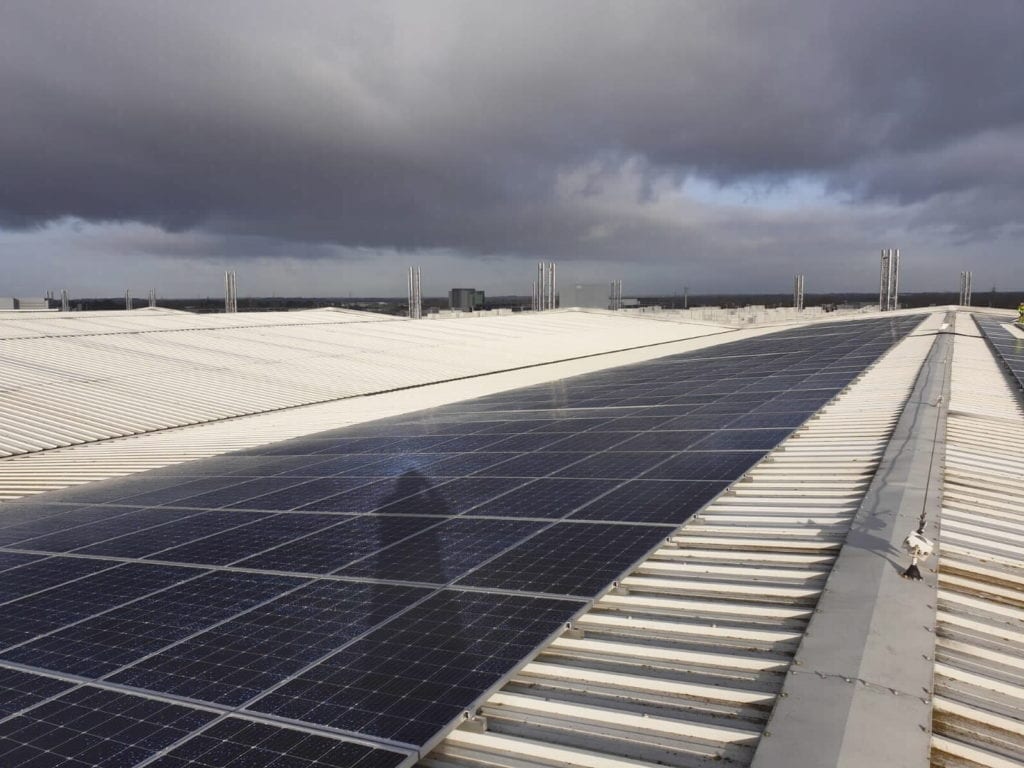
BWG Foods recently completed the installation of almost 800 solar panels at its National Distribution Centre in Dublin
Working with retailers
Without a doubt, it is a challenge for businesses to change their operations and technical equipment retrospectively – this is true for all companies across the globe, large and small. BWG provides real value to their retail network through their expertise in the area, staying abreast of latest developments and identifying new solutions that will create benefits in kind for them and their business. By sourcing new equipment and creating initiatives at a group level such as the solar panel installation scheme, the new refrigeration systems, and the LED lighting installation scheme – BWG will make the transition for over 1,000 independent retailers they partner in the Spar, Eurospar, Mace, Londis and XL more cost effective, less resource intensive and easier to understand and adopt.
Working with the foodservice sector
The pursuit of a green agenda is also, O’Brien is quick to highlight, one that is increasingly topical within the foodservice sector. BWG counts a number of state and semi-state bodies such as the HSE, the Irish Prison Service, the Defence Forces, nursing and care homes, as well as countless other hospitality and licenced businesses among clients and people are becoming ever more discerning about whom they do business with and what their fundamental beliefs and practices might be. These practices also go to the essence of BWG’s philosophy and the combined ambitions of the organisation and, crucially, its people.
“Transitioning to become a more sustainable business supports our overall operations with benefits that go beyond the financial incentives such as improved reputation among customers and key stakeholders, among our employees and within the wider business environment,” O’Brien says. “This brings valuable returns that support us with recruitment and retention, the development of positive relationships with our customers, our retailers and their consumers that ultimately all contribute to our bottom line. We also have buy-in across the whole company with everyone embracing the short-term goals and measurable targets we have introduced that all employees can work towards, which helps us to track our ongoing performance. Positively, it is clear the broader industry from representative bodies to suppliers and employees also understand and welcome the efforts that we have made at BWG, many of which have been a first for our sectors in Ireland.”
As consumers increasingly embrace social causes, they seek products and brands that align with their values. According to a 2020 IBM report by Karl Haller, Jim Lee, and Jane Cheung, nearly six in 10 consumers surveyed are willing to change their shopping habits to reduce environmental impact. Nearly eight in 10 respondents indicate sustainability is important for them. And for those who say it is very/extremely important, over 70% would pay a premium of 35%, on average, for brands that are sustainable and environmentally responsible.
With push-back against single-use plastic and plastic-dense packaging mounting, brands have had to make savvy moves to adapt. In recent years, several brands have stepped-up to the mark and removed single-use plastic from their ranges. And for good reason – research from Kantar found that when asked about the most acceptable and effective solutions to reducing plastic waste, 72% of Irish consumers endorsed packaging that can be 100% recycled. While it said consumers accept that plastic packaging has an important role to play, they are concerned that it should not go to landfill or find its way into the ocean.
Of course, while packaging is a natural focus for sustainability within the FMCG sector, the leading companies within this sphere are adopting an all-encompassing sustainability-focused ethos right across their businesses, as outlined across these pages.
Sustainable cardboard packaging
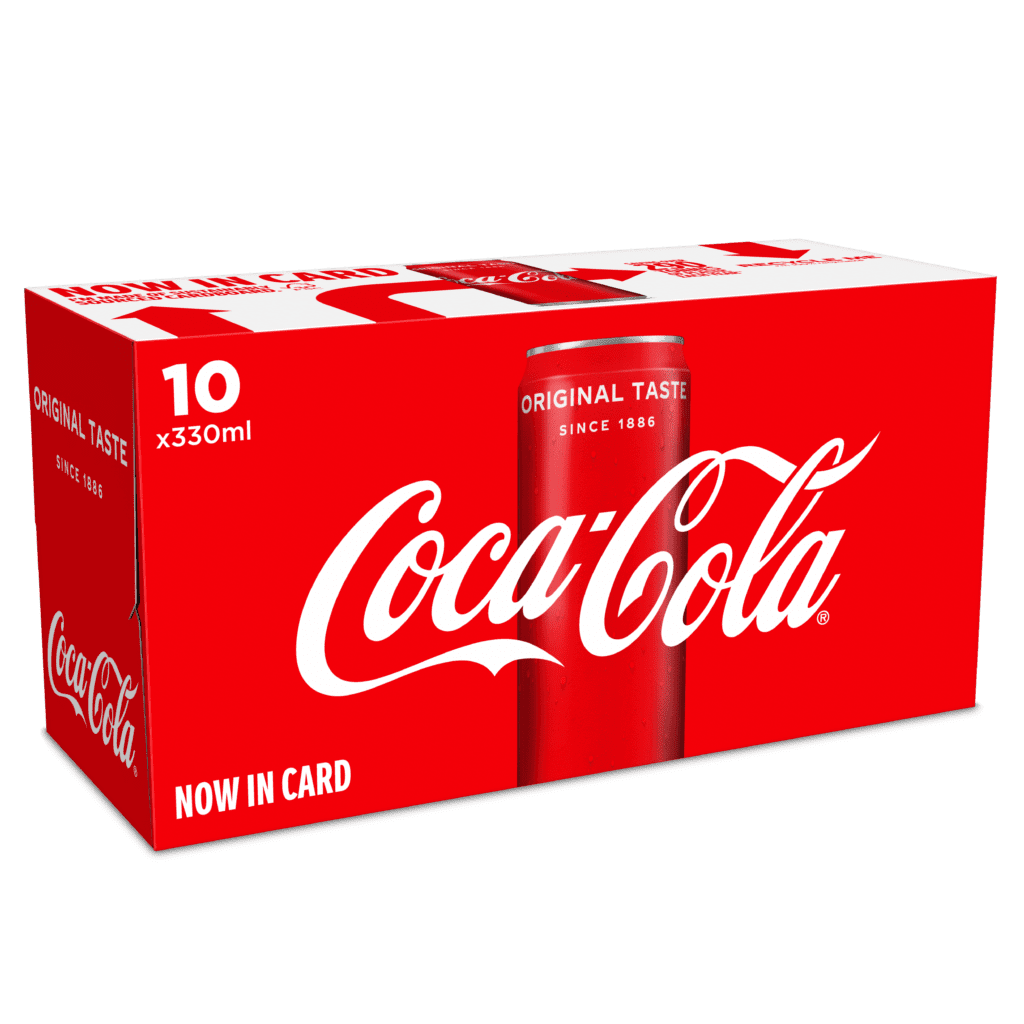
Coca-Cola’s move to more sustainable secondary packaging will save 500 tonnes of plastic each year
Together with Coca-Cola Ireland, Coca-Cola HBC Ireland and Northern Ireland has today announced a further milestone in its ambition to achieve a ‘World Without Waste’ by 2030, moving all multi-pack cans within its range to more sustainable cardboard packaging.
The move will apply to all products within the multi-pack can range, including Coca-Cola, Coca-Cola Zero Sugar, Diet Coke, Fanta and Sprite.
Larger multi-packs (10, 12, 20 and 24 cans) will be available in cardboard packaging from April 2021. This follows the introduction of new ‘KeelClip’ late last year, which saw smaller multi-packs (4, 6 and 8 cans) transition to an innovative cardboard solution.
In total, the move to more sustainable cardboard packaging will eliminate more than 500 tonnes of hard-to-recycle shrink wrap plastic each year.
The Coca-Cola HBC Group was recently recognised as the world’s most sustainable beverage company by the Dow Jones Sustainability Index, acknowledging the company’s commitment to creating and sharing value for all stakeholders.
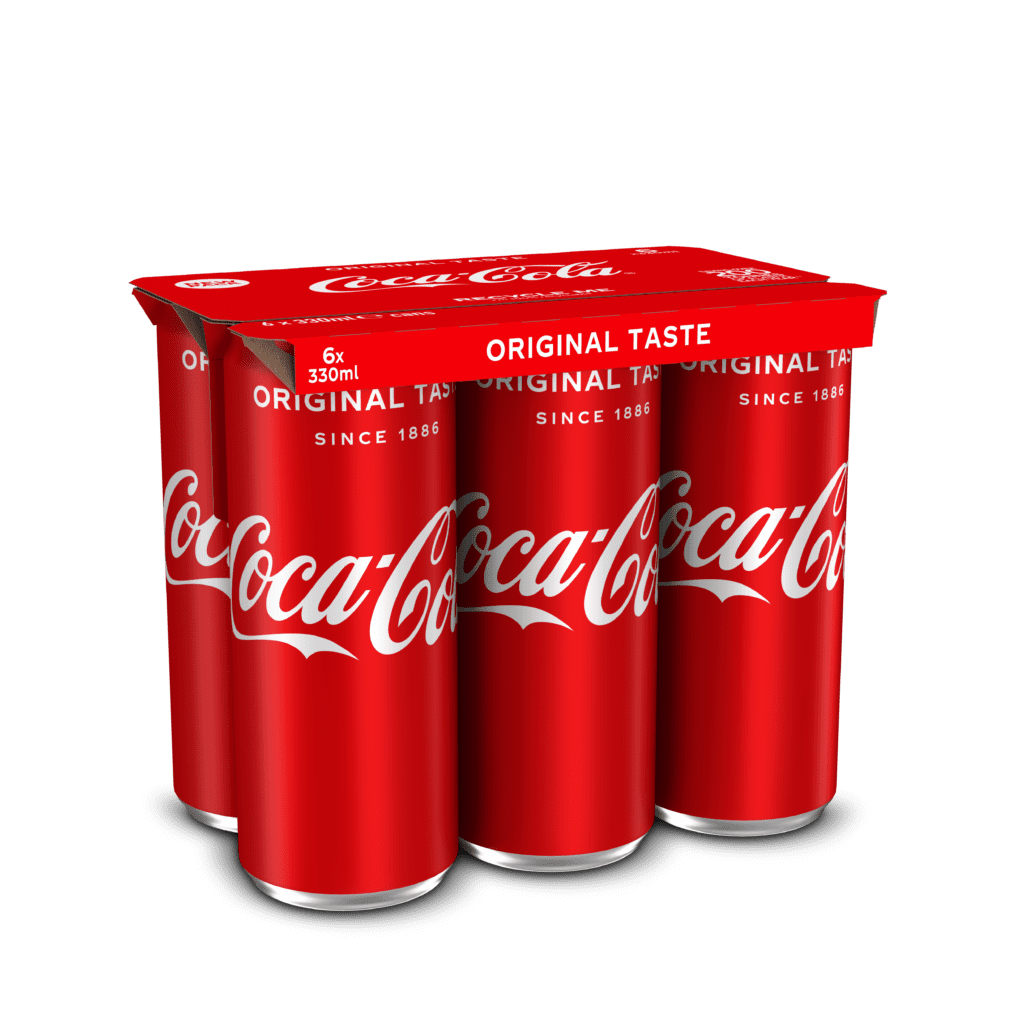
In total, Coca-Cola HBC has reduced plastic use by almost 5,000 tonnes a year since 2019
Key to this commitment is a focus on designing more sustainable packaging to create a true circular economy for packaging materials. In Ireland and Northern Ireland, all of the bottles and cans sold by Coca-Cola HBC are 100% recyclable and the company has invested extensively in recycled plastic. Today, 45% of its total plastic portfolio is made from recycled materials, an innovation which has removed 3,450 tonnes of new plastic each year. The amount of plastic used in its bottles has also been reduced by 10% since 2018, through various redesign initiatives.
As a result of these investments, the company has eliminated the need for almost 5,000 tonnes of new or unnecessary plastic on an annual basis.
“We are immensely proud to be the first soft drink producer in Ireland to move all our multi-pack cans to more sustainable cardboard packaging solutions,” said Tom Burke, public affairs and communications director, Coca-Cola HBC Ireland and Northern Ireland. “This achievement is a further milestone in our journey towards our vision of a World Without Waste, and eliminates the need for more than 500 tonnes of shrink wrap plastic annually.”
“Combined with our investment in more recycled plastic and our reduction in overall plastic use, in total we have now eliminated the need for almost 5000 tonnes of plastic annually, since 2019,” Burke added.
The Coca-Cola system is also committed to collecting back 100% of the bottles and cans it sells by 2030 and is actively investing in partnerships and infrastructure that will increase recycling rates.
To read more about Coca-Cola HBC’s sustainability vision and commitments in Ireland and Northern Ireland, visit ie.coca-colahellenic.com.
Q&A…with Tom Burke, public affairs and communications director, Coca-Cola HBC Ireland and Northern Ireland
A: What did 2020 hold for you in terms of your strategy to achieve a ‘World Without Waste’?
Like all businesses, Covid-19 created many unforeseen challenges and disrupted our ways of working more than we could have ever envisaged. However, one of the greatest sources of pride for me is that we navigated the pandemic, protecting our people and maintaining business continuity, and with a steadfast commitment to our ambitious sustainability agenda.
Our strategy to create a ‘World Without Waste’ remained a key priority for Coca-Cola HBC throughout 2020. A key focus area is to design more sustainable packaging – we are committed to ensuring 100% recyclability for out bottles and cans, integrating more recycled content into our packs, and reducing unnecessary packaging.
We are also working to improve collection and recycling rates for packaging across the island. Our commitment is that by 2030, 100% of our bottles and cans will be collected for recycling. With the right infrastructure, and partnerships with industry and government, we’re confident that we can achieve this ambitious target.
Q: Why is sustainability such an important part of your company focus?
A: For Coca-Cola HBC, sustainability is not a ‘nice to have’ but rather a key enabler of our journey to become a leading 24/7 beverage partner to our customers. It is also more than environment stewardship – it is a commitment to create and share value for all our stakeholders. This is a principle that has guided our strategy for our more than 80 years of operations on the island.
Our group has also set an ambitious sustainability targets called Mission 2025 and this progress focuses on six areas: emissions reduction; water reduction and stewardship; World Without Waste; sustainable sourcing; nutrition; and our people and communities.
I’m proud to say that this our holistic commitment to sustainability came to fore throughout the pandemic as we worked to support our communities, however and wherever we could.
As part of the relief effort, we donated 1 million of our drinks to frontline healthcare staff and funded over 100,000 meals to foodbanks and charities via FoodCloud. We also leveraged our supply chain where we could, providing 10,000 bottles for use as hand sanitiser dispensers for care homes across the island.
We now have plans to reshape our community support programmes to support those most in need
We are reworking the youth development programmes that we operate, #YouthEmpowered and the Thank You Fund, to provide meaningful support to young people who need support to restart their career and play a proactive role in building a better future for their communities.
Q: How do you ensure buy-in for your sustainability agenda across your organisation?
A: Ensuring we have the right people in the right positions is key to delivering on our sustainability commitments. We also deploy several initiatives to heighten employee awareness and engagement, encouraging environmental stewardship right across our organisation. These include our ‘Ambassador’ programme which supports employees to understand the actions we are taking to minimise our impact on the environment and wide-ranging internal communication strategies, including a dedicated campaign for ‘Sustainability Month’.
Q: How do you measure success in sustainability?
A: For me, success is sustainable business growth that creates value for all, with respect for the environment and the communities in which we operate.
We are proud to have been recognised externally for our commitment to sustainability. Just recently, the Coca-Cola HBC Group ranked as the world’s most sustainable beverage company in the Dow Jones Sustainability Index. This is the fifth time in the last seven years that Coca-Cola HBC has been recognized as the global beverage industry leader.
Locally, we were also awarded ‘Green Manufacturer of the Year’ in 2020 and have achieved ‘platinum status’ by Business in the Community Northern Ireland Environmental Benchmarking Awards.
Q: How has Coca-Cola worked to encourage more consumers to recycle bottles and cans?
A: In Ireland, seven out of 10 bottles are collected for recycling, but we recognise that there is more work to do.
As mentioned, our World Without Waste strategy aims to achieve 100% collection of bottles and cans by 2030.
We are active members of Repak and have also been working closely with the wider industry, NGO and government bodies over the last year to assess how we can play a proactive role in developing the right recycling infrastructure in Ireland.
For Coca-Cola, this work has already started. Last year, thanks to investment from The Coca-Cola Foundation, we launched Dublin #CircleCity – a partnership with environmental charity Hubbub that funds recycling stations across the city.
Recycling messages are now included on our all our packs and our TV ads.
Deep RiverRock, our water brand, also launched a sustainability campaign to celebrate its 100% recycled bottle. ‘Made to make a difference’ was a full 360 campaign launched last year, to highlight the importance of creating a closed loop for packaging and encourages everyone to play their part by making small changes.
Sustainably sourced
Despite the impact of Covid-19, Ritter Sport UK & Ireland posted another record year, outperforming the block chocolate market with growth of +37%* YOY.
“Quality and sustainability are absolutely core to Ritter Sport,” says Katy Clark, head of marketing, Ritter Sport UK & Ireland. “Frankly we are obsessed with both, we have been the leading example of sustainability within the chocolate industry for over 30 years! We were the first and we believe still the only major manufacturer to exclusively use 100% certified, sustainably sourced cocoa, having done so since 1 January 2018, this is a fact we are incredibly proud of. But perhaps the most effective example of this industry leading behaviour is our own highly sustainable 2,500 hectare cocoa plantation in Nicaragua El Cacao. To date we have grown and planted one million+ cocoa trees utilising the sustainable agroforestry methodology, built around 100km of roads, and employed around 500 colleagues all paid well above average pay levels.
“We can and must do more, such as our commitment to transition to paper packaging by 2025,” she adds, “but our continued growth is testament that more people than ever are choosing to do good when they eat chocolate and they do that by choosing Ritter Sport.”
*(Source: Nielsen Homescan total coverage, block chocolate market 80g+ 52 WE 26.12.20)
Leading by example
Bewley’s, Ireland’s leading coffee and tea company has been at the forefront of Irish coffee and tea culture since its humble origins as a tea importer in the 1800s. Over 180 years later, Bewley’s has evolved and thrived, becoming a household name in not only the food and beverage market but also the wider hospitality industry.
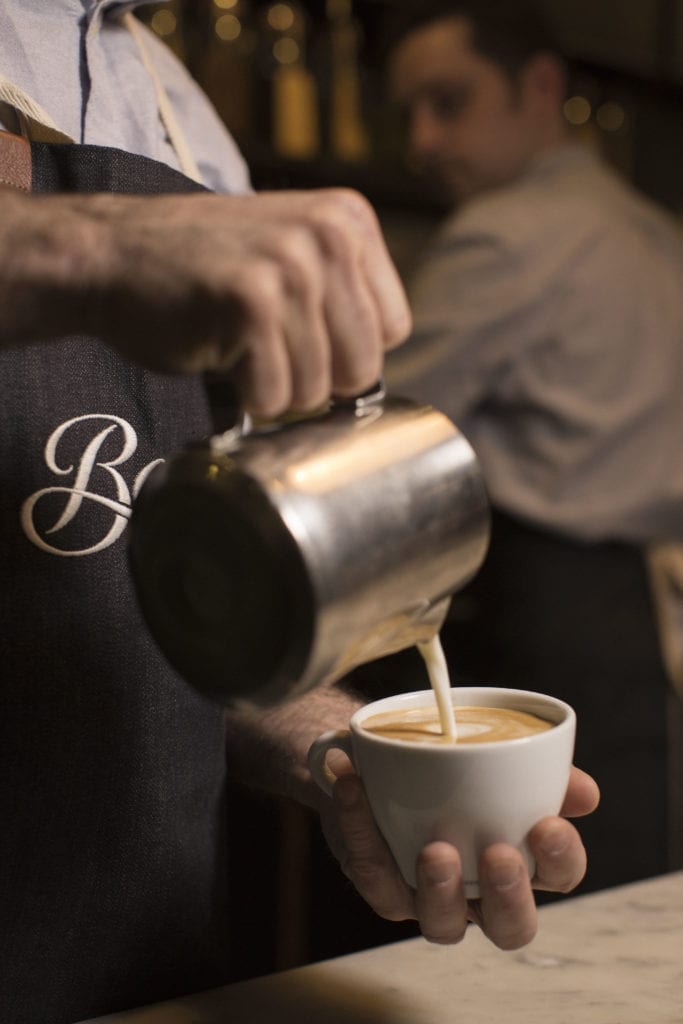
Having crafted tea and coffee for generations, Bewley’s continues to lead by example by shaping the Irish coffee market with a particular focus on sustainability. Bewley’s’ work to date highlights the brand’s continuous effort to bring sustainability to the forefront of its operations which in turn has positioned the company as a leading voice when it comes to running a business in an environmentally conscious way.
First in Fairtrade
2021 marks 25 years of Fairtrade with Bewley’s, the first brand in Ireland to import Fairtrade certified coffee in 1996. Twenty years later in 2017, Bewley’s celebrated yet another milestone achievement, announcing that all branded coffee going forward would be 100% Fairtrade certified.
A company that understands the importance of being ethical and responsible, Bewley’s’ commitment to Fairtrade is supported by its deep values in sustainability, conducting business in a way that improves the health of the planet and the lives of all those involved in the bean-to-cup process.
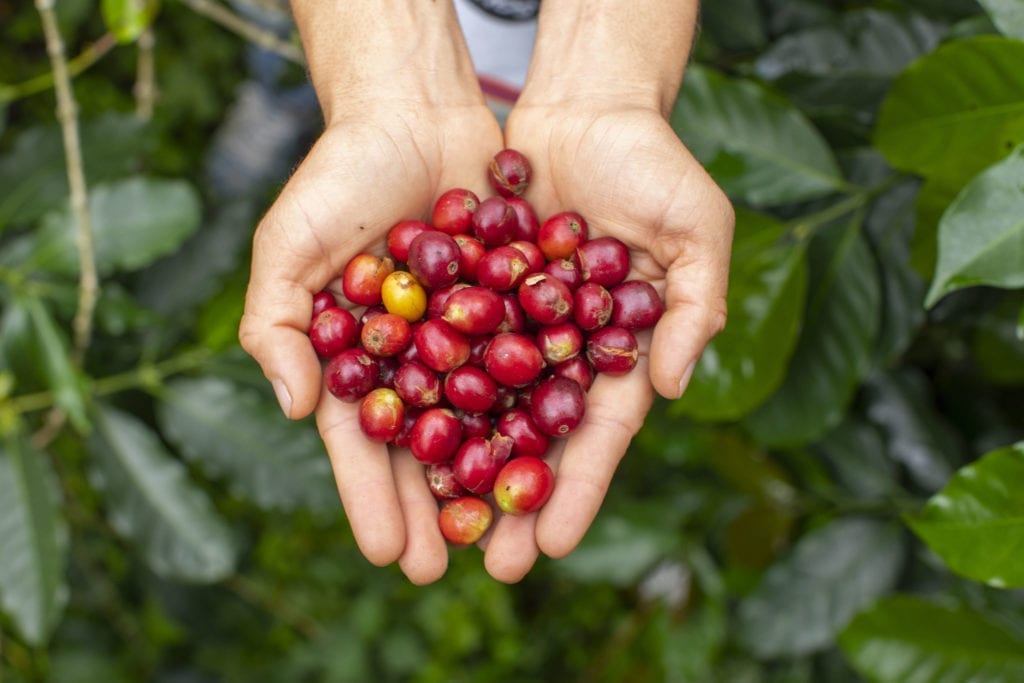
Bewley’s Plant-Based Coffee brings alternative milk options to Bewley’s operators nationwide
Bewley’s has made a global impact on Fairtrade coffee, contributing to 1.5% of global Fairtrade coffee premiums and approximately half of Fairtrade premiums in Ireland. Fairtrade premiums provide workers and farmers with revenue that accumulates in a communal fund. This fund can be used to improve social, economic, and environmental conditions for all Fairtrade workers.
Jason Doyle Managing Director of Bewley’s Ireland and Uk, says there is a strong sustainability ethos and structure in Bewley’s that comes from the top down.
“Bewley’s is such a significant contributor to Fairtrade in Ireland that one out of every two Fairtrade coffees sold in Ireland is a Bewley’s coffee,” he says. “When you boil it down and look into the details, Bewley’s contributes 1.5% of all Fairtrade premiums paid to coffee farmers globally. It’s incredible when you think about the scale of some of the operators in the market.”
First carbon neutral coffee brand
Along with its work in Fairtrade, Bewley’s has made significant steps towards becoming more sustainable within its operations in Ireland. The Bewley’s headquarters has been carbon neutral since 2008 which led to the brand offsetting all its Scope 1 and Scope 2 emissions in Ireland and the UK in 2009, becoming Ireland’s first fully carbon neutral coffee brand.
Conscious of the importance of stabilising waste and reducing carbon emissions, Bewley’s has also dropped the waste it sends to landfill by 84% since 2010 as well as reduced its CO2 emissions per tonne of manufactured coffee by 62%.
“Sustainability is not something where you reach a finish line,” Doyle adds. “It’s continually evolving and there’s always something you need to do next.”
Plant-based alternatives
At present, Bewley’s continues to be at the forefront of the latest trends and changes that will help shape the Irish hospitality industry into a more sustainable and eco-conscious environment. One such change is the launch of a new plant-based menu solution for Bewley’s operators nationwide, a concept conceived as part of a partnership with alternative milk experts Alpro to introduce an innovation to the Irish coffee market.
Bewley’s Plant-Based Coffee provides an alternative for coffee drinkers, with all traditional milk-based coffees prepared using the Alpro Barista For Professionals range including, Oat Gluten Free, Coconut, Soya and Almond options.
The Bewley’s Plant-Based Coffee offering was announced following the results of Bewley’s annual coffee report which revealed a significant increase in plant-based coffee consumption amongst consumers in Ireland. The report showed a substantial rise in consumers opting for plant-based drinks, with nearly a third confirming they have tried plant-based alternatives. Nearly two thirds (62%) of coffee drinkers believe it’s important for their local coffee provider to offer more than one choice of plant-based drink.
Bewley’s has a proud reputation of being the first to adapt to many milestone moments in the Irish coffee industry. A company that understands the importance of being ethical and responsible, Bewley’s deep values in sustainability ensure that the brand will continue to conduct business in a way that improves the health of the planet and the lives of all those involved in the coffee production process.
Q&A with… Simon Pickering, country manager, Essity
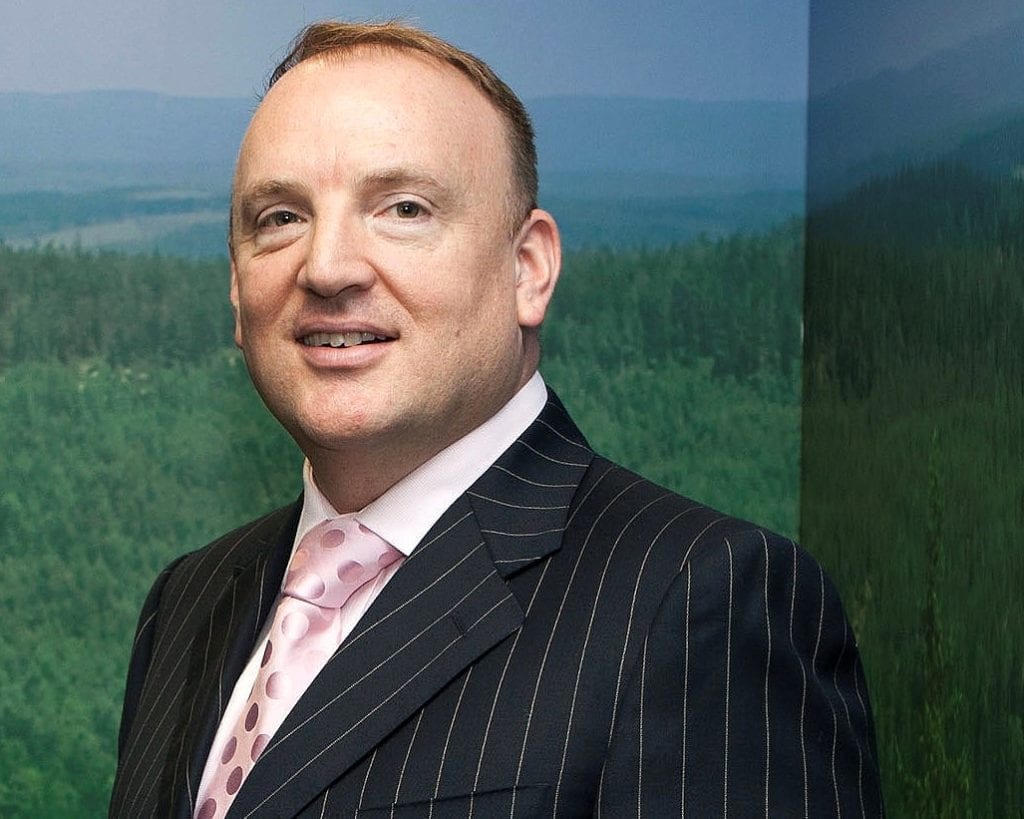
Simon Pickering
Q: What are the main measures have you implemented recently to improve your sustainability credentials?
A: Fibre sourcing: In 2019, Essity introduced a new target that all raw materials derived from wood-based fresh fibre in the company’s products and packaging are to be certified in accordance with the Forest Stewardship Council (FSC) or the Programme for the Endorsement of Forest Certification (PEFC). Target fulfilment in 2020 was 95% (79 in 2019; 76 in 2018). All wood-based fresh fibre must fulfil the FSC’s Controlled Wood standard, as a minimum, to be eligible for purchasing.
Essity’s targets to reduce absolute greenhouse gas emissions were approved by the Science Based Targets initiative in 2018. In terms of energy consumption within the company and purchased electricity (Scope 1 and 2), Essity has undertaken to reduce greenhouse gas emissions by 25% by 2030 compared with 2016. The target applies to wholly owned companies. The outcome for 2020 was –11% (–5, –5) for Scope 1 and 2.
Q: How do you intend to improve further in the future and do you have timelines in place for these goals?
A: Essity has a series of long-term sustainability commitments related to many areas of our business including fibre sourcing, packaging, waste reduction, employee safety, social wellbeing and more. For example, we have committed to achieving 100% recyclable packaging by 2025 with 85% of our packaging made with renewable or recycled materials.
Our innovation pipeline is also key to improving our sustainability credentials. In 2020, we launched Cushelle Double Roll in sustainable packaging, and in 2021 we have brought our first ever reusable menstruation and incontinence underwear products to the market under the Bodyform and Tena brands.
We are also looking to add sustainability values through partnerships with organisations such as WWF. In 2021, we unveiled our first ever brand partnership between Cushelle and WWF which aims to provide much needed funding and awareness of the ongoing wildlife conservation efforts in Australia following the devastating bushfires in 2020.
Q: Why is sustainability such an important focus for your business?
A: Contributing to a sustainable and circular society is central to our global mission and vison and as such, it is a priority for Essity as a business.
In 2020, we conducted a large piece of consumer research in the UK and ROI with the objective of understanding if and how the Covid-19 pandemic has influenced consumer perception and behaviour towards sustainability. The results were intriguing with 50% of consumer stating they had become more sustainable since the first lockdown, and 80% of those stating that they intended to stick to their new more sustainable behaviour afterwards. We published all of the findings in The Green Recovery report which was published in June 2020 and featured commentary for leading sustainability experts including environmental activist Ella Daish, and the Women’s Environmental Network.
The launch of the report coincided with the launch of our new approach to sustainability in the UK and ROI – The 4 Rs. The 4 Rs which are Recycle, Reuse, Reduce, and Responsible are the four pillars through which all of our sustainability work is channelled. In short, our ambition is that everything we do drives a positive change in at least one of these areas.
Q: What are the biggest challenges to overcome for your business and industry to improve sustainability further?
A: One of the key findings from our Green Recovery report was that consumers are feeling confused about all of the different terms, phrases, and buzzwords that exist when it comes to sustainability. We believe that our industry and the different categories that our products sit under need to come together and strive for consistency in the way that we talk about sustainability. We can’t expect to bring about positive long-term change if consumers can’t differentiate between the products that are genuinely more beneficial to the environment and the products that are using misleading terminology and claims to create a perception of sustainability.
Every Can Counts
Every Can Counts has announced its first ever drinks brand partnership in Ireland with carbon neutral, Irish start-up, The Naked Collective, to help inspire and encourage more people to recycle their empty drink cans.
The partnership will see The Naked Collective join forces with Every Can Counts, drink can manufacturers and the recycling industry to raise awareness of the importance of recycling and increase recycling rates in Ireland.
As part of the partnership, The Naked Collective will provide funding to the Every Can Counts programme, with both brands working together to spread the message that drink cans are endlessly recyclable.
Founded in 2019 and based in County Kildare, The Naked Collective specialises in vegan, low-sugar vitamin drinks designed to meet the needs of both health and eco-conscious shoppers.
Its first two product ranges, which recently launched in Ireland and the UK, include Mude and So.Beer – a range of vegan, natural sparkling beverages and non-alcoholic lagers.
The Naked Collective is a carbon-neutral company. From sourcing its plant-friendly ingredients to recyclable and compostable packaging for its cans and boxes, sustainability is at the forefront of the brand. Its partnership with Every Can Counts Ireland builds on its sustainability commitments and will help it achieve its goal of ensuring that 100% of its cans are recycled.
Every Can Counts is a unique partnership formed between drink can manufacturers and the wider recycling industry, all with the goal of reaching a 100% recycling rate for drinks cans.
To find out more about Every Can Counts Ireland, visit www.everycancounts.ie.
Chicken champions
Sicín Sásta, a 100% Irish chicken brand has sustainability at the heart of its ethos; a great tasting chicken doesn’t happen by accident! Sicín Sásta is all about embodying Irishness; our great quality produce, our cheeky nature, and our care for the environment.
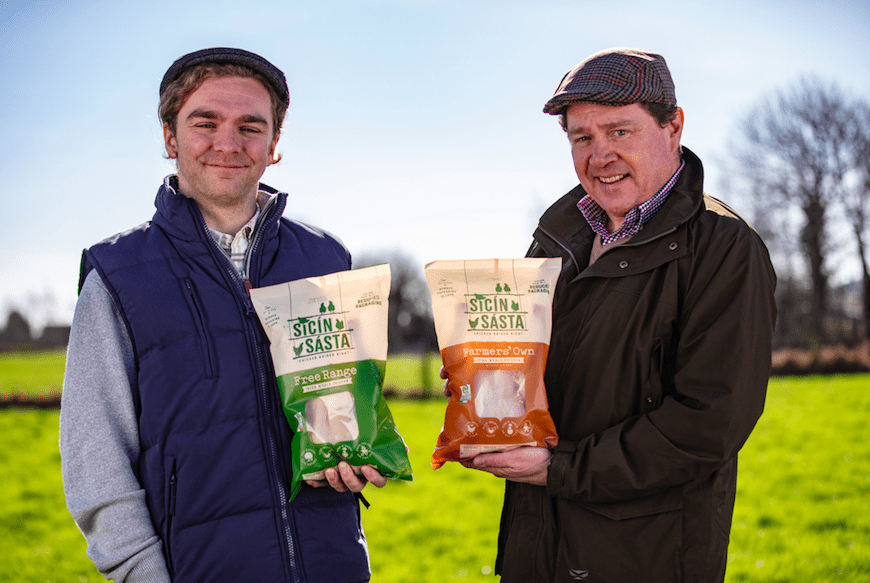
Sicín Sásta chickens can roam their home and play on swings and seesaws all day long
The Sicín Sásta diced chicken fillet packs have 15% less packaging and the whole fillets are in a tray that uses 60% less packaging and includes a lining to keep it clean and ready to recycle once removed. The whole chicken does not come with a leg-tie or in a tray and the separate elements have been removed to create just one useful bag that functions as effectively.
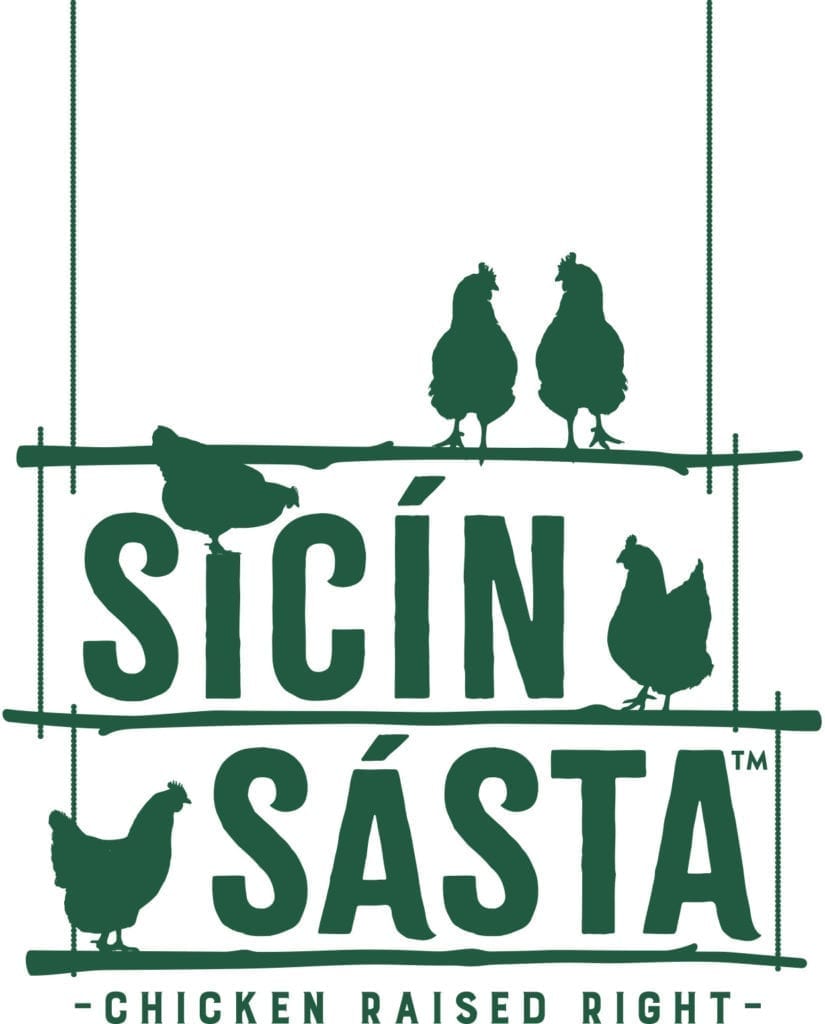
Tackling sustainability, however; not only means reducing packaging but going right back to the beginning of the chicken-rearing process. Sicín Sásta is proud of its modern, environmentally friendly agricultural practices. Many Sicín Sásta farms have their own wells and any farms that don’t will filter, purify and clean any water that does come in for the best drinking water for the chickens. Sicín Sásta has also planted 42,000 Sitka Spruce trees and 3,000 hardwoods. Even the chopped straw to pad the floor of the chicken houses is sourced from local cereal farms of which it is a by-product.
According to a study conducted by Sicín Sásta, 74% of consumers feel that meat should be sourced from animals that are cared for. Sicín Sásta chickens can roam their home where they have been hatched and play on their swings and seesaws all day long!
Sicín Sásta free-range chicken is available in a 1500g whole chicken and 500g chicken breast fillets.
For more information, visit: www.sicinsasta.ie.
Ambitious new targets
Sustainability has always been an important part of Britvic Ireland’s strategy and over the last eight years the business has made major progress across all areas of sustainabililty. This includes achieving zero waste to landfill, switching to 100% renewable electricity for all its Irish manufacturing sites and ensuring that all bottles are 100% recyclable.
The company has now refreshed its sustainability strategy with ambitious new targets for 2025 under the ‘Healthy People, Healthy Planet’ programme. This strategy runs throughout the business, ensuring every initiative – from manufacturing to marketing – is built on a sustainable foundation. Transparency and reporting are key and Britvic has signed up to the Science Based Targets Initiative with a commitment to a 50% reduction in manufacturing carbon emissions by 2025. In fact, the Ballygowan bottling plant has already reducing manufacturing emissions by over 90%. There are equally ambitious commitments around packaging circularity – by 2025, all of packaging will be fully recyclable and contain a minimum of 50% recycled content. The new Ballygowan relaunch hitting shelves now is a real statement of intent – 100% recycled and 100% recyclable bottles of locally sourced natural mineral water.
Low Carbon Pledge
Over 60 of the largest companies in Ireland have publicly committed to set targets based on science by 2024. They are the first signatories of Business in the Community Ireland’s new Low Carbon Pledge.
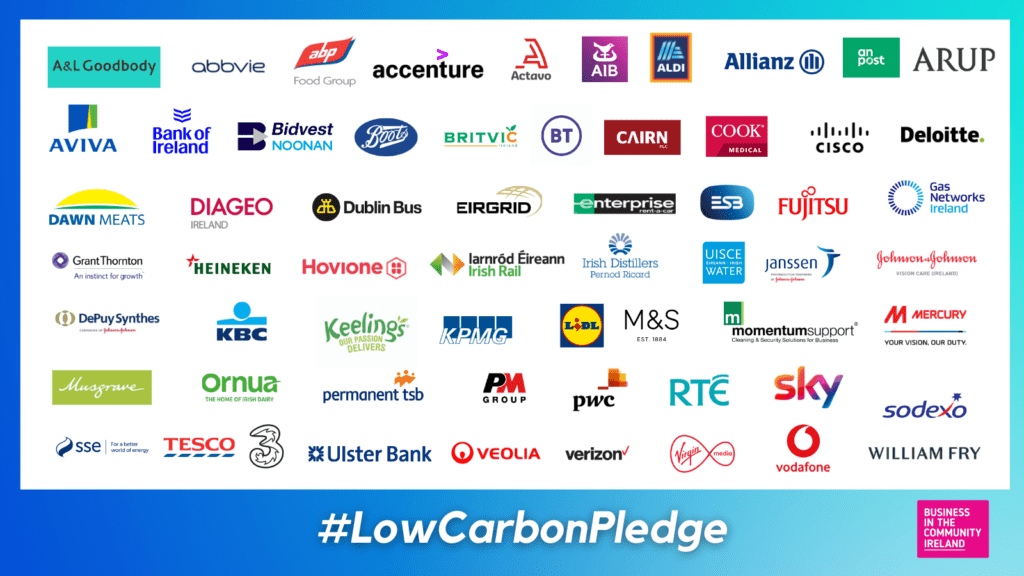
Over 60 companies have signed up to Business in the Community Ireland’s new Low Carbon Pledge
Business in the Community Ireland, the national network for sustainability, created the initial Low Carbon Pledge in 2018 with the aim of being a starting point for member companies to commit to cutting their carbon footprint, report annually on their progress and develop a credible roadmap towards a net zero economy. The new Low Carbon Pledge now calls on businesses to set science-based carbon emission reduction targets no later than 2024 (i.e. what science says is necessary to limit global warming to 1.5°C).
The 61 signatories are: A&L Goodbody, Abbvie, ABP Foods, Accenture, Actavo, AIB, ALDI, Allianz, An Post, Arup, Aviva, Bank of Ireland, Bidvest Noonan, Boots, Britvic, BT Ireland, Cairn Homes, Cisco, Cook Medical, Dawn Meats, Deloitte, DePuy Synthes, Diageo, Dublin Bus, EirGrid, Enterprise-Rent-a-Car, ESB, Fujitsu, Gas Networks Ireland, Grant Thornton, Heineken Ireland, Hovione Ireland, Irish Rail, Irish Distillers, Irish Water, Janssen, Johnson & Johnson Vision Care, KBC Bank, Keelings, KPMG, Lidl, M&S, Momentum Support, Mercury Engineering, Musgrave, Ornua, Permanent TSB, PM Group, PwC, RTÉ, Sky, Sodexo, SSE, Tesco, Three Ireland, Ulster Bank, Verizon, Veolia, Virgin Media Ireland, Vodafone and William Fry.
The Low Carbon Pledge is a clear demonstration of businesses driving towards decarbonisation, creating the business models, innovation and jobs for a low carbon future,” said Tomás Sercovich, CEO, Business in the Community Ireland. “As more businesses join this Pledge, we will use our collective voice to drive the new systems thinking we need to overcome this fundamental challenge.”
Bio-based packaging
Nestlé has announced that it will introduce bio-based lids and scoops made from sugar cane and its by-product for a range of its nutrition products for babies and children.
The main advantage of these bio-based plastics is that they are made from a renewable plant material that can be continually replenished and that absorbs carbon dioxide from the atmosphere. In addition, this packaging helps Nestlé reduce its use of fossil-based plastics as part of its ambition to halve its emissions by 2030 and achieve net zero by 2050.
In Ireland and the UK, SMA Nutrition and Nestlé Health Science are rolling out the new bio-based packaging materials for scoops and lids on tins.
“Nestlé continues to push the boundaries of science to provide nutritional solutions for children, and we are putting that same passion into pioneering new packaging that is good for our planet,” said Thierry Philardeau, head of Nestlé Nutrition.
The lids and scoops are made from 66% and 95% sugar cane respectively. They are certified as plant-based plastic packaging and are widely recyclable. The bio-based lids and scoops complement the tin can which is metal-based and the most recycled material in the world. This innovation is one of the many solutions Nestlé is working on to address the issue of packaging waste.
Nestlé is a founding member of the Bioplastics Feedstock Alliance that aims to encourage production of bioplastics feedstocks in an environmentally responsible, socially beneficial and economically viable manner.
Rooting for change; how do we accelerate our use of plant-based materials?
By Nazanin Moradi, sustainability transformation manager, Tetra Pak Europe

Nazanin Moradi
In 2020, the impact of climate change continued to be felt in every corner of our planet. The amount of CO2 in the atmosphere reached record levels, hitting 417 parts per million in May. Europe saw its hottest year ever.
The time to act is now. Consumer preferences are already shifting in response to these environmental changes; according to Tetra Pak’s latest Index report, 70% now identify packages made from plant-based materials as the most relevant packaging option to them.
Opportunities
Imagine a future where all polymers are either made from plant-based materials or post-consumption recycled food grades. A few years ago, petrochemicals company Braskem started using sugar cane to make climate-smart polyethylene, a material which has a low carbon footprint.
Tetra Pak has been very active in this space, engaging with plant-based polymers in Europe since 2015. But we’ve found innovative product design is also key to reducing packaging’s carbon impact. It can reduce the weight and increase the space-saving efficiencies of packages. Innovating with plant-based materials also lets companies create climate-smart products with an authentic look and feel, helping them to stand out to environment-conscious consumers.
Tetra Pak’s Craft packaging material does exactly this, giving a ‘natural’ look while reducing a carton’s weight by 5%. Paired with fully renewable materials, like the Tetra Rex plant-based package, made from FSC-certified paperboard and plastic derived from sugar cane, this impact is drastically enhanced.
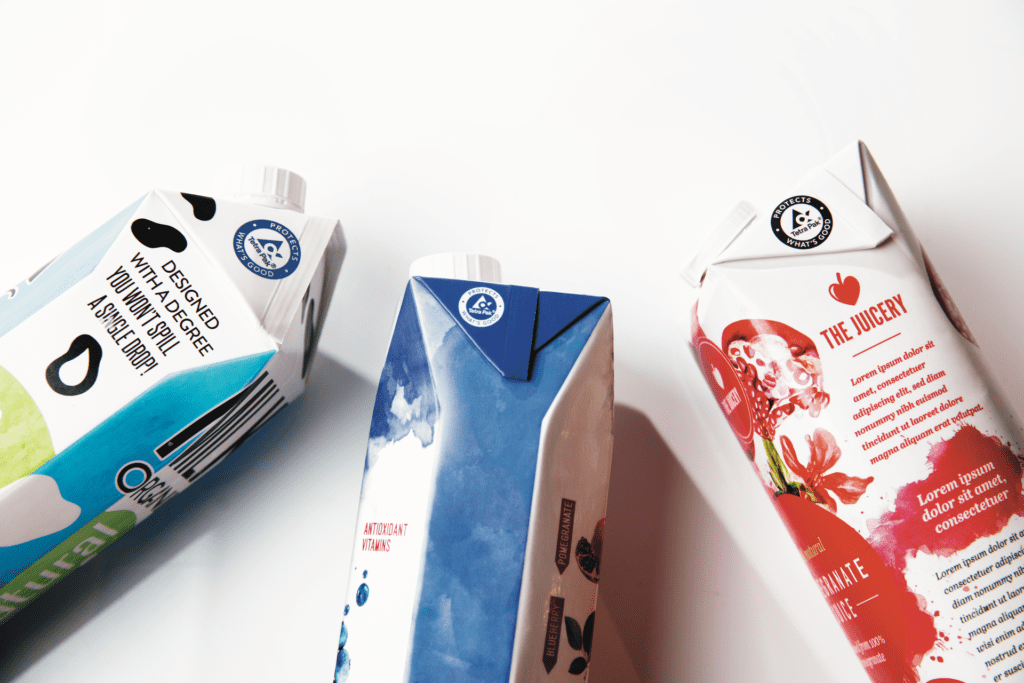
Tetra Rex plant-based packages are made from FSC-certified paperboard and plastic derived from sugar cane
Working together in new ways
Tetra Pak is working with leading paperboard companies Stora Enso, Klabin and BillerudKorsnäs in a ‘collaborative innovation model’ to find solutions to some of the industry’s greatest challenges, like improving carton recyclability faster, removing the thin polymer and aluminium layers in carton packaging, and developing a renewable alternative to the plastic straw.
Tetra Pak has also been working closely with Recon Polymers, a recycling management company based in the Netherlands. The partnership aims to fully recycle two of the constituent materials in cartons – polymers and aluminium – into raw, recycled materials that can be used by the plastics industry.
Pooling resources like this is an effective way to decouple both industry and society from fossil-based fuels faster, increasing our use of recovered materials and creating a reduction in emissions down the value chain.
Improving supply chain traceability and trust
Increasing visibility amongst consumers needs to be a major focus area over the next few years, so that consumers can identify and support companies driving positive change.
In 2020, Tetra Pak ran a pilot programme with the Carbon Trust to label Tetra Rex plant-based package as ‘carbon neutral packaging’. This programme clarified and supported sustainability claims made by customers, helping consumers to understand the climate impact of the packaging they purchase.
Q&A with…Russell and Garrett Walsh, founders, VivaGreen
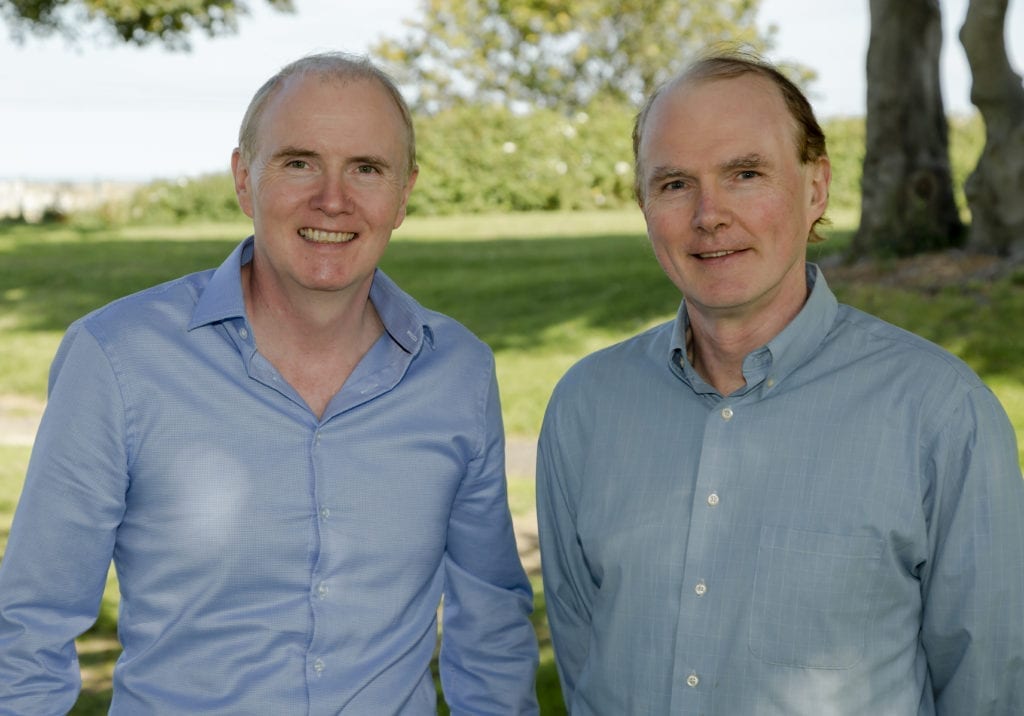
Russell and Garrett Walsh
Q: Why is sustainability such an important focus for your business?
A: VivaGreen has been researching and manufacturing eco-friendly products in Ireland for over 25 years. Research shows that cleaning products are released into the environment during normal use, through the evaporation of volatile components and rinsing down the drain of residual products from cleaned surfaces, sponges, etc. Seeking a green solution, we developed of our range of eco-friendly, refillable laundry and household cleaning products called, Tru Eco. The range is made from plant-based and biodegradable ingredients and each bottle is made from 100% recycled plastic, creating a circular economy product that is reusable, recyclable, and refillable.
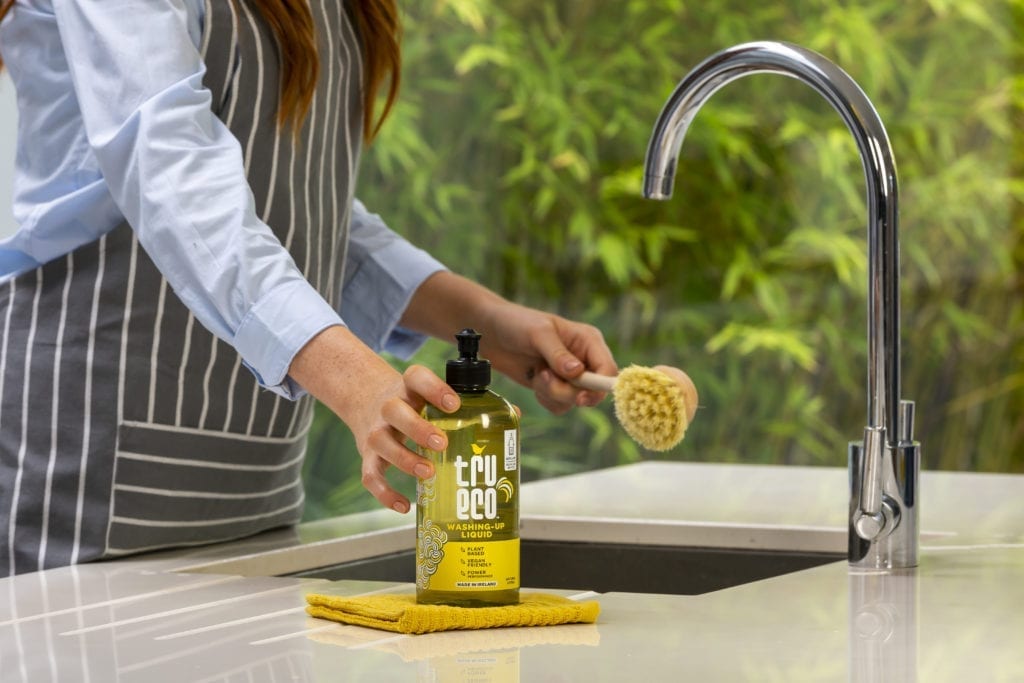
The Tru Eco range is made from plant-based and biodegradable ingredients
Q: Have you seen a rise in the demand for your eco-friendly range?
A: Yes, buying behaviours are changing and consumers are actively looking for eco-friendly solutions. We are in a distinctive position with Tru Eco as consumers are not only looking for green alternatives, but also Irish made products. We have exceeded our sales targets and feedback from customers has been fantastic with lots of interest in the refill option, which is very encouraging. The range is currently available in SuperValu stores nationwide and will be available in Dunnes Stores nationwide in the coming weeks.
Q: How do you promote the Tru Eco range and what future activity have you planned?
A: We place a great deal of value in incorporating PR into our business planning and it has delivered a lot for us in terms of promotion, with editorial coverage in national and local print, broadcast, and digital channels. Digital and social media also plays a key role, achieving coverage in Mummypages,ie, MyKidsTime.ie, Evoke.ie, Her.ie, and SHEmazing.ie.
Q: How significantly has environmental awareness increased among consumers?
A: Environmental awareness has increased significantly; awareness days such as Earth Day on 22 April, the world’s largest environmental movement, have gathered huge momentum in recent years. The media is also actively trying to educate consumers on the benefits of switching to eco-friendly products. We work hard to develop products that meet consumer needs, while also trying to protect the environment. By buying the Tru Eco range, consumers can reduce their environmental footprint, minimise plastic waste as well as lower their carbon emissions.
Paving the path to a bright future
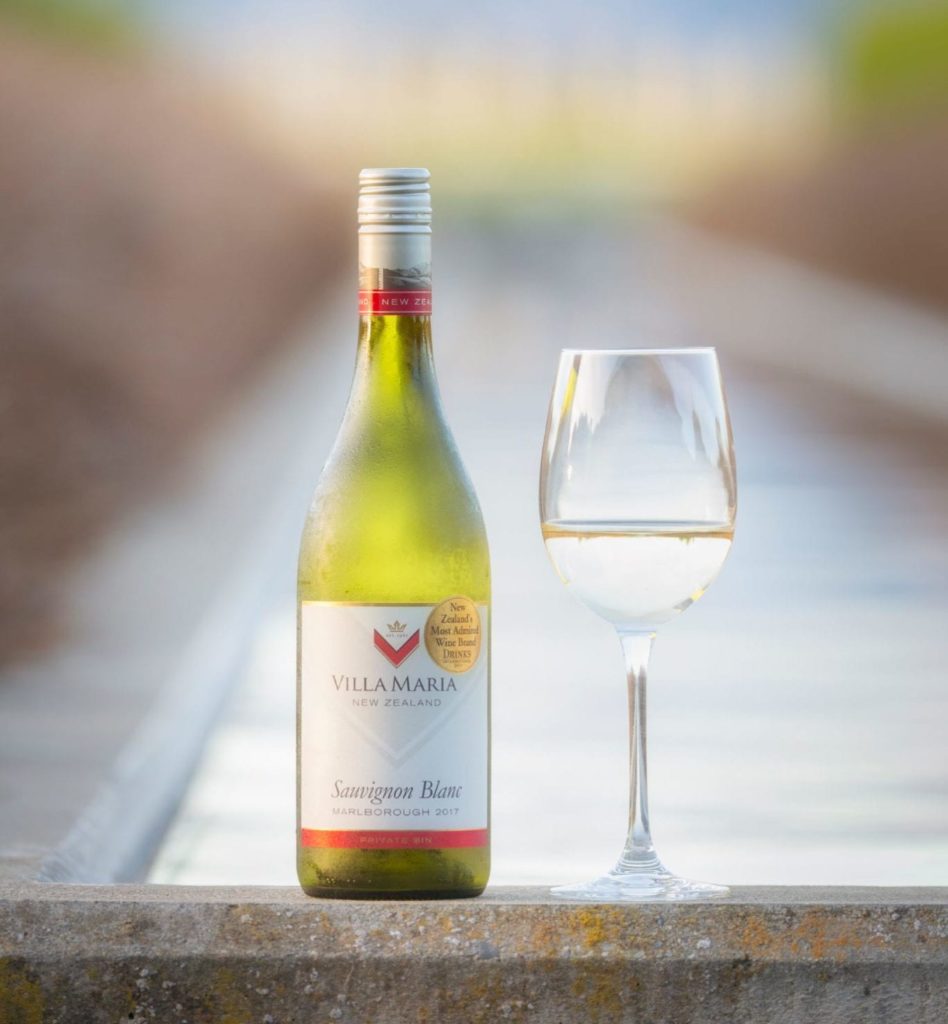
Villa Maria bottles are made from 69% recycled glass
Founded by Sir George Fistonich in 1961, Villa Maria remains to this day a highly awarded, quality focused, New Zealand owned winery with vineyards throughout the nation’s key winegrowing regions.
“As a family company, the desire to leave something for the next generation is an ever-present and overriding business objective,” said Sir George Fistonich, founder and owner.
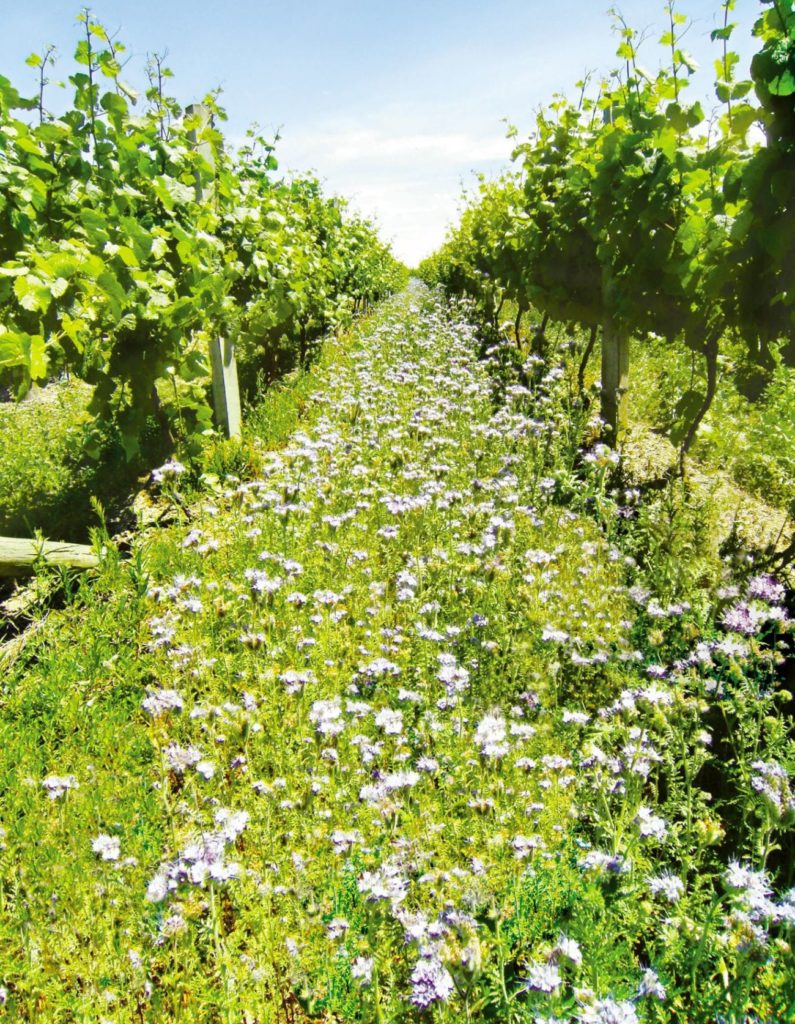
Over 700kgs of wildflower seeds are planted in Villa Maria’s vineyards every year.
Respecting the land is central to Villa Maria, which believes the care its team put into the soil and conscious tending of vines, results in a better taste.
In fact, Villa Maria has been a Sustainable Winegrowing New Zealand member since 1997, with over 700kgs of wildflower seeds planted in its vineyards every year. What’s more, 30% of Villa Maria owned vineyards are managed organically.
As part of Villa Maria’s environmentally friendly ethos, carbon emissions have been reduced by 39% per bottle of wine since 2009, electric warehouse forklifts have been used since 2011, and the company operates under a ‘zero waste to landfill’ policy by 2025.
The group is also inspiring conscious consumers; its bottles are made from 69% recycled glass, resulting in lower carbon emissions and all its packaging can be recycled.
Villa Maria’s sustainability and organics certifications demonstrate that the group meets and maintains international best practice standards in this area and push the team to strive for ways to continuously improve practices.
Villa Maria is distributed by Barry & Fitzwilliam.
A carbon negative brew
In 2020, BrewDog announced it was the world’s first carbon negative brewery. Its goals include planting 1 million trees at the new BrewDog Forest by 2022. BrewDog is also working on a fast-track 24-month plan to reduce the carbon footprint of operations, along with its journey to become zero-waste. This includes plan includes five key elements.
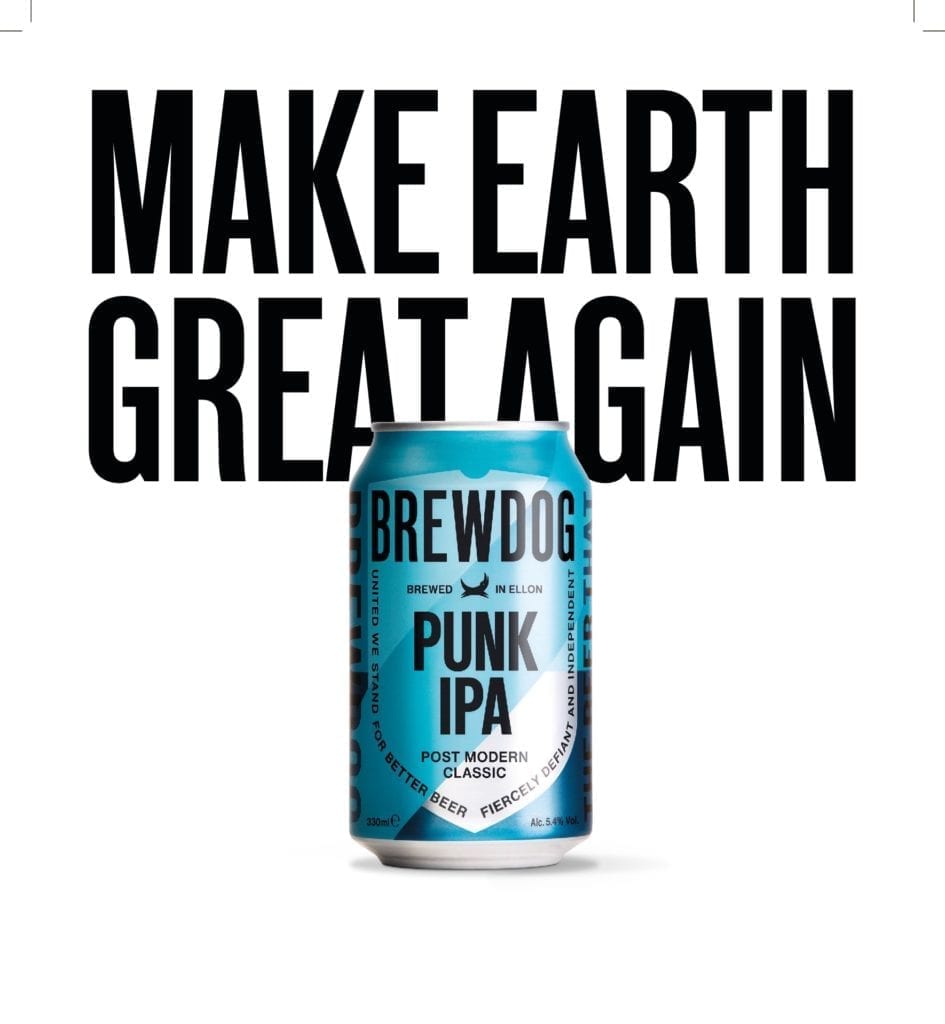
BrewDog has become the world’s first carbon negative brewery
The first being green energy; BrewDog turns the main natural by-product of beer making, malted barley, into green gas (biomethane), thus removing any reliance on fossil fuels in the brewing process.
Secondly, all of the electricity used to brew BrewDog beer in the UK comes directly from local wind turbines. Some of the BrewDog bars are now also powered by wind turbines too.
The third key element is the use of an anaerobic digestor. Water is one of the most precious resources and the supply is under increasing pressure. However, BrewDog won’t waste a drop — an anaerobic digester bio-plant turns waste brewery water into pure H and biomethane to be re-used and is set to be operational this year.
The next step on BrewDog’s journey to become zero-waste is the use of electric delivery vehicles. The team is fast-tracking the electrification of its vehicle fleet and the first fully electric delivery vehicles will hit the streets this year.
Lastly, one of the by-products of fermentation is CO2. BrewDog is working on capturing the CO2 produced during fermentation and using this downstream to carbonate its beers.
As a result, by drinking BrewDog beer, you are genuinely having a positive impact on our planet.
BrewDog is distributed by Barry & Fitzwilliam.
A real catch!
Donegal Catch is one of the leading fish brands in Ireland and has been a family favourite in Irish households for over 30 years. Part of Green Isle Foods, this Irish-owned company employs over 100 people across two sites. While headquartered in Naas, Co Kildare, its primary fish processing facility is located in Gurteen, Co. Sligo and has been in continuous operation since 1984. Green Isle Foods is the largest purchaser of white fish from the Irish catching sector and processes over 20% of Irish-landed haddock and whiting. The company works closely with fish suppliers to bring customers great tasting fish, processed to the highest-quality standards and fully traceable back to the boat.
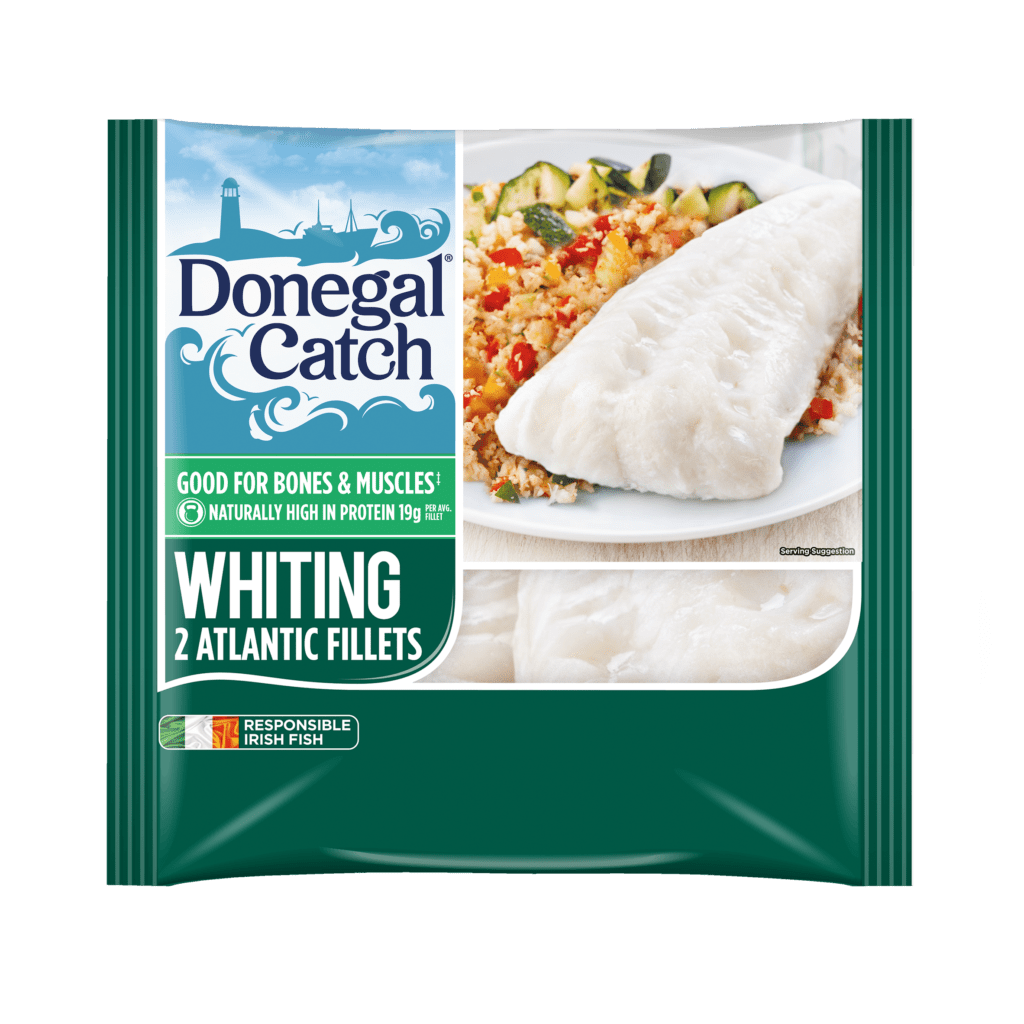
Donegal Catch is participating in the Bord Iascaigh Mhara backed Fishery Improvement Project (FIP) to improve fishery sustainability for Irish haddock, whiting and hake
Donegal Catch has an important role to play in the sustainable development of the Irish fishing industry and the protection of our waters. To that end, the group is participating in the Bord Iascaigh Mhara backed Fishery Improvement Project (FIP) to improve fishery sustainability for Irish haddock, whiting and hake. The FIP is a five-year plan and covers fishing practices, onshore handling and data collection for marine scientists. Donegal Catch procures fish from Irish co-ops and fishermen who are members of the FIP.
For other wild caught species such as Atlantic cod, the company uses up-to-date scientific data from non-governmental organisations (NGOs) on the health of different fisheries to guide it on where to catch fish and monitors the maximum sustainable yield (MSY) of a catch area to ensure stocks remain healthy.
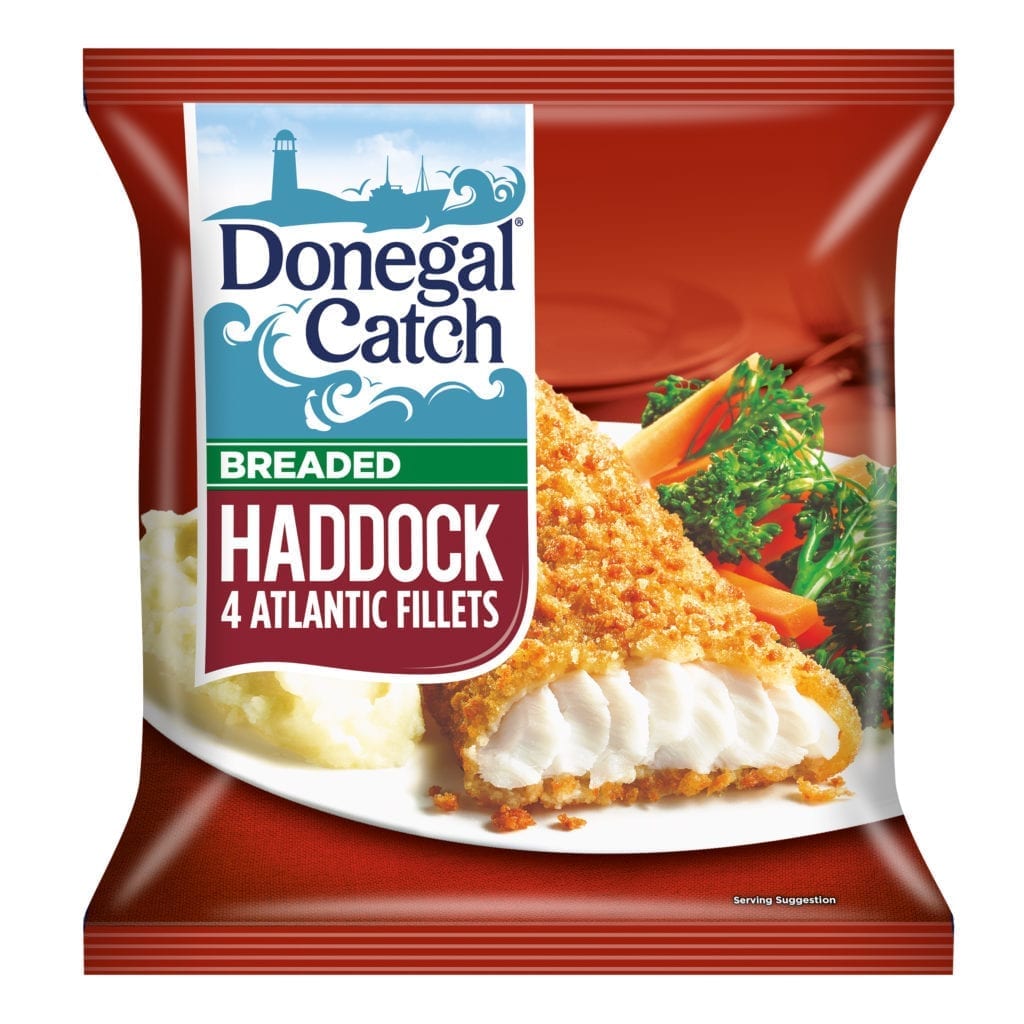
Donegal Catch products are fully traceable back to the boat
Reducing plastic within its supply chain is an area of continuous focus and the group is committed to 100% recyclable plastic by 2022. Although soft plastic is not yet recyclable through the domestic system in Ireland, the company is playing its part to prepare for this. In April 2021, Donegal Catch products are moving to a single plastic LDPE film with a plastic identification code to aid recycling. The company also aims to remove palm oil from its products by the end of this year while not compromising quality or taste.
Last year in SuperValu and Tesco, Donegal Catch implemented a sustainability communication campaign to highlight our sustainably caught Irish haddock and whiting ranges. These campaigns were supported both online and instore through its social platforms, content hubs on retailer websites and point of sale. This year, Donegal Catch’s aim is to grow these activations by engaging and educating consumers through its digital platforms and excellent in-store executions.
Visit www.donegalcatch.ie for more on the brand’s sustainability journey.



 Print
Print

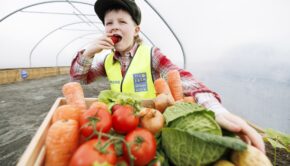


Fans 0
Followers